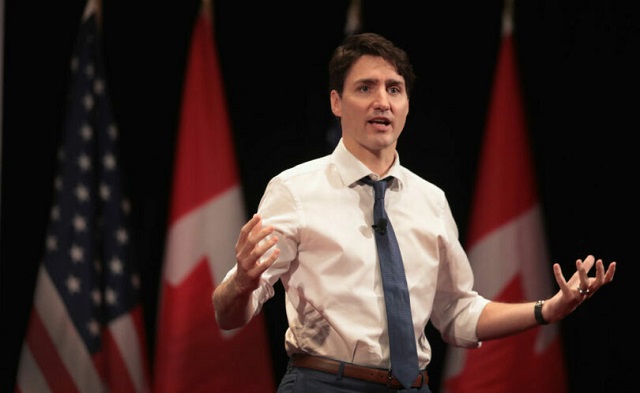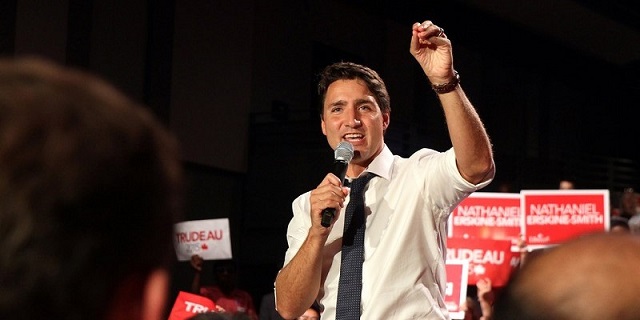National
Trudeau’s 2024 budget includes $150 million to promote ‘2SLGBTQI+’ ideology at home and abroad

Photo by Scott Olson/Getty Images
From LifeSiteNews
The Trudeau government plans to expand ‘equity groups’ to include people who identify as ‘2SLGBTQ+’ and to spend tens of millions of taxpayer dollars to promote its ‘Federal 2SLGBTQI+ Action Plan’ and ‘embed’ LGBT issues in the Canadian government.
The Trudeau government’s 2024 budget features plans to spend tens of millions of taxpayer dollars to promote LGBT ideology at home and abroad and to expand “equity groups” in the workforce to include people who identify as “2SLGBTQI+.”
According to Canada’s 2024 Budget, Prime Minister Justin Trudeau intends to spend $150 million over 10 years and to expand the Employment Equity Act to further advance LGBT ideology.
“Following the recommendations of the Task Force, Budget 2024 announces the government’s intention to propose legislative amendments to modernize the Employment Equity Act, including by expanding designated equity groups,” the budget states.
Under Canada’s Employment Equity Act, women, Aboriginal peoples, persons with disabilities, and members of visible minorities are included as those deserving of “special measures” by employers. However, the Trudeau government is now seeking to broaden that to add those who identify as “Two-Spirit, lesbian, gay, bisexual, transgender, queer, [and] intersex,” as well as “additional [so-called] sexually and gender diverse people.”
The taxpayer dollars will be used “to support Canada’s first Federal 2SLGBTQI+ Action Plan, a whole of-government approach to prioritize and sustain 2SLGBTQI+ community action, to advance and strengthen 2SLGBTQI+ rights [sic] at home and abroad, and to embed 2SLGBTQI+ issues in the work of the Government of Canada.”
The commitment to promote the LGBT agenda in the government and workplaces comes after a December report recommending legislative changes to hiring practices from merit-based ones to practices favoring minority groups.
One recommendation suggested employers should “correct” underrepresentation of minority groups among their staff.
However, Trudeau’s spending of public funds to push homosexual and transgender ideology should not come as a surprise to Canadians.
Last June, during the designated month of LGBT “pride,” the Trudeau government pledged $1.5 million in what it claims is “emergency funding” for “pride” month to fund increased security to organizations running parades, which often feature nudity and extremely graphic homosexual activity.
Later the same month, records revealed that the Liberal government gave $12 million for “pride” events during COVID lockdown years.
Economy
Ottawa’s homebuilding plans might discourage much-needed business investment

From the Fraser Institute
In the minds of most Canadians, there’s little connection between housing affordability and productivity growth, a somewhat wonky term used mainly by economists. But in fact, the connection is very real.
To improve affordability, the Trudeau government recently announced various financing programs to encourage more investment in residential housing including $6 billion for the Canada Housing Infrastructure Fund and $15 billion for an apartment construction loan program.
Meanwhile, Carolyn Rogers, senior deputy governor of the Bank of Canada, recently said weak business investment is contributing to Canada’s weak growth in productivity (essentially the value of economic output per hour of work). Therefore, business investment to promote productivity growth and income growth for workers is also an economic priority.
But here’s the problem. There’s only so much financial capital at reasonable interest rates to go around.
Because Canada is a small open economy, it might seem that Canadian investors have unlimited access to offshore financial capital, but this is not true. Foreign lenders and investors incur foreign exchange risk when investing in Canadian-dollar denominated assets, and the risk that Canadian asset values will decline in real value. Suppliers of financial capital expect to receive higher yields on their investments for taking on more risk. Hence, investment in residential housing (which the Trudeau government wants to promote) and investment in business assets (which the Bank of Canada warns is weak) compete against each other for scarce financial capital supplied by both domestic and foreign savers.
For perspective, investment in residential housing as a share of total investment increased from 22.4 per cent in 2000 to 41.3 per cent in 2021. Over the same period, investment in two asset categories critical to improving productivity—information and communications equipment and intellectual property products including computer software—decreased from 30.3 per cent of total domestic investment in 2000 to 22.7 per cent in 2021.
What are the potential solutions?
Of course, more financial capital might be available at existing interest rates for domestic investment in residential housing and productivity-enhancing business assets if investment growth declines in other asset categories such as transportation, roads and hospitals. But these assets also contribute to improved productivity and living standards.
Regulatory and legal pressures on Canadian pension funds to invest more in Canada and less abroad would also free up domestic savings for increased investments in residential housing, machinery and equipment and intellectual property products. But this amounts to an implicit tax on Canadians with domestic pension fund holdings to subsidize other investors.
Alternatively, to increase domestic savings, governments in Canada could increase consumption taxes (e.g. sales taxes) while reducing or even eliminating capital gains taxes, which reduce the after-tax expected returns to investing in businesses, particularly riskier new and emerging domestic companies. (Although according to the recent federal budget, the Trudeau government plans to increase capital gains taxes.)
Or governments could reduce the regulatory burden on private-sector businesses, especially small and medium-sized enterprises, so financial capital and other inputs used to comply with often duplicative or excessive regulation can be used to invest in productivity-enhancing assets. And governments could eliminate restrictions on foreign investment in large parts of the Canadian economy including telecommunications, banking and transportation. By increasing competition, governments can improve productivity.
Eliminating such restrictions would also arguably increase the supply of foreign financial capital flowing into Canada to the extent that large foreign investors would prefer to manage their Canadian assets rather than take portfolio investment positions in Canadian-owned companies.
Canadians would undoubtedly benefit from increases in housing construction (and subsequently, increased affordability) and improved productivity from increased business investment. However, government subsidies to home builders, including the billions recently announced by the Trudeau government, simply move available domestic savings from one set of investments to another. The policy goal should be to increase the availability of risk-taking financial capital so the costs of capital decrease for Canadian investors.
Author:
National
British Columbia quickly shoots down bill to ban men from competing in women’s sports

From LifeSiteNews
‘There are inherent differences between males and females, ranging from chromosomal and hormonal differences to physiological differences,’ bill author and B.C. Conservative leader John Rustad said.
The provincial legislature of British Columbia quickly voted down a Conservative bill seeking to prohibit men who believe themselves to be women from participating in women’s sports.
On April 30, British Columbia Members of the Legislative Assembly (MLAs) voted 51 to 27 against B.C. Conservative leader John Rustad’s bill to protect women from having to compete against men in sports.
“I’m proud to say before this House, the amazing women and girls who are here with us today, that this piece of legislation is not only the first of its kind in Canada, but it was an entirely female-led initiative from start to finish,” Rustad told the assembly.
“The bill was written by women and girls for women and girls,” he added.
Bill M214, the Fairness for Women’s and Girl’s Sports Act, would have mandated that all publicly-funded sports and athletic teams, events and tournaments be classified by sex.
“Participation in a sporting team or event must be limited to individuals of the biological sex that corresponds to the sex classification of the sporting team or event,” the bill said.
The bill provided an exception to allow women to participate in men’s sports, but men were banned from competing in women’s sports. The bill offered a provision for male and female players to play together in a co-ed league or event.
“There are inherent differences between males and females, ranging from chromosomal and hormonal differences to physiological differences,” Rustad explained.
“But more than the obvious differences, over time, women and girls have struggled to be identified as a person,” he stated. “They have struggled to have the right to vote. They have struggled to be allowed to be in certain places, and they have struggled to be paid fairly.”
“And here today in 2024 in this Legislature, the necessity to move forward the bill is to make sure that once again, women are treated fairly,” he appealed.
Rustad argued that sex-separated sports are “vital in order to maintain the fairness for women and girls’ athletic opportunities in British Columbia.”
“I would urge all members of this House to vote in support of this legislation because we all deserve to live our lives with integrity,” he declared.
However, the bill was quickly shut down in its first reading, with the ruling New Democratic Party (NDP) voting against the initiative.
The vote was met with dismay by many Canadians, including female powerlifter April Hutchinson, who is known for speaking out against men dominating women’s sports.
“Here is the complete list of members who voted for and against The Fairness in Women’s & Girls sports Act,” she posted on X, formerly known as Twitter.
“British Columbia residents! Ask your MLA why they voted against protecting women and girls and hold them @bcndp accountable,” she encouraged.
Here is the complete list of members who voted for and against The Fairness in Women's & Girls sports Act.
British Columbia residents! Ask your MLA why they voted against protecting women and girls and hold them @bcndp accountable. Again, a huge thanks to @JohnRustad4BC and the… pic.twitter.com/QPlpMAZT8V— April Hutchinson (@Lea_Christina4) May 1, 2024
“Again, a huge thanks to @JohnRustad4BC and the @Conservative_BC who displayed great courage respect and integrity today,” she declared.
Rustad’s initiative is similar to legislation the neighboring province of Alberta has promised to pass which also seeks to bar men from women’s sports.
Regardless of the claims of LGBT activists, studies continue to back up the common sense reality that males hold a massive advantage over women in athletic competitions. A recent study published in Sports Medicine found that even a year of cross-sex hormones results in “very modest changes” in the inherent strength advantages of men.
-

 Education2 days ago
Education2 days agoSupport a young reader through the Tim Hortons Smile Cookie campaign
-

 Business2 days ago
Business2 days agoWEF panelist suggests COVID response accustomed people to the idea of CBDCs
-

 illegal immigration2 days ago
illegal immigration2 days agoFlight Docs Reveal Which Cities Are Receiving Migrants Under Biden’s Parole Program
-

 Fraser Institute2 days ago
Fraser Institute2 days agoCanada can solve its productivity ‘emergency’—we just need politicians on board
-

 Environment2 days ago
Environment2 days agoJournalism Misrepresent Climate Science
-

 International2 days ago
International2 days agoNYPD storms protest-occupied Columbia building, several arrested
-

 illegal immigration2 days ago
illegal immigration2 days agoOklahoma Just Became The Latest State To Take Immigration Enforcement Into Its Own Hands
-

 Economy2 days ago
Economy2 days agoToday’s federal government—massive spending growth and epic betting







